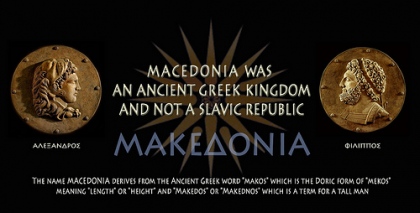
The Macedonian Fight Museum presents to the international public its last publication: “Macedonia: A Greek term in modern use,” which aims to show visually and with documents the strong influence of the name Macedonia on the Greek society, administration, social life, culture, and economics since Greek Macedonia joined the country in 1912.
The word “Macedonia” and all its derivatives are widely used in the Greek language ever since ancient times. Its use does not only refer to the geographical location but is also a strong Hellenic symbol during the classic and Hellenic era. The research shows the wide presence of the term “Macedonia” in contemporary Greek as a cultural concept and a nickname for the region. In the past, it has always been a Hellenic symbol, which was not under discussion.
The argument about the name “Macedonia,” as a name for another country, was temporarily solved during 1993 with the acceptation of the name “Former Yugoslavian Republic of Macedonia.” The uses of the name were confusing and unclear and especially the uses of the noun “Macedonians,” and the adjective “Macedonian,” in all its regional, cultural, historic, and law variations. In the former Yugoslavian republic the noun “Macedonians” means: 1. All citizens of the Republic, including Albanians, Greeks, Romanians, etc as well as 2. Ethnic/national meaning – million and a half local Slavic population.
In Greece the noun “Macedonians” denotes a regional/cultural meaning of two and a half million population of ethnic Greeks, who live in the region of Greek Macedonia. The same name “Macedonians,” in Bulgaria denotes hundredths of thousands of ethnic Bulgarians. The publication does not aim to analyze the political argument between Athens and Skopje over the name.
And if the data provided from the publication cannot help the argument about the clear identification of the different Macedonian variations, it explains why Greeks – more specifically Greek Macedonians, cannot agree on the use of the name and culture being monopolized by another country, because they believe it is their property.